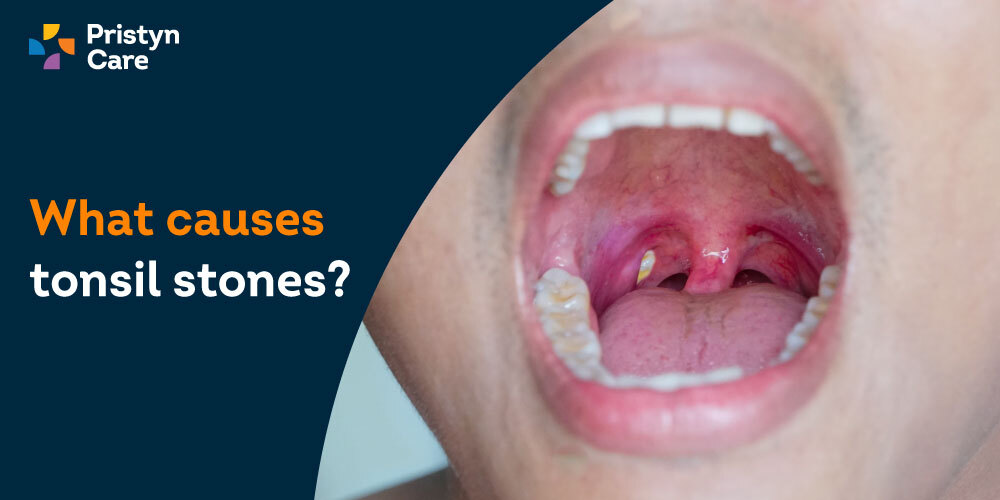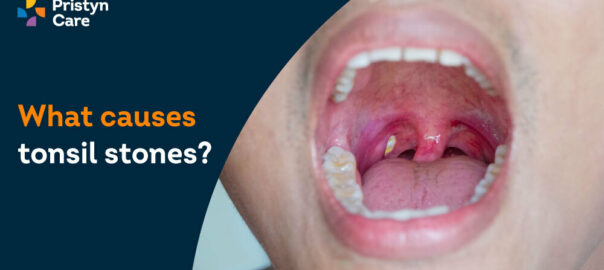![]() Views: 17,528
Views: 17,528
Swollen Tonsils (Inflamed Tonsils): Symptoms & Causes
Swollen tonsils, medically referred to as tonsillitis, involve the inflammation and enlargement of the tonsils. Positioned on either side of the throat, the tonsils are clusters of tissue that form part of the body's immune system, helping to fight off infections. Swelling of the tonsils can be triggered by various factors, including viral or b...
acterial infections. Read moreAs a result, individuals may experience a range of symptoms, such as a persistent sore throat, discomfort while swallowing, and general throat pain. In some cases, the enlarged tonsils may exhibit white or yellow patches of pus. Although swollen tonsils can affect people of all ages, they tend to be more prevalent among children.
Dedicated Support at Every Step!
Our Doctors are available 24 hours a day, 7 days a week to help you!
Table of Contents
What is Swollen Tonsil?
Timely medical attention and treatment are typically recommended to address the symptoms and identify the underlying cause of the swelling. Healthcare professionals may perform a physical examination, inquire about the patient's medical history, and conduct additional tests, such as throat swabs or blood tests, to determine the specific cause of the swollen tonsils.
Treatment options may include pain relief measures, such as over-the-counter painkillers or gargling with warm salt water, as well as prescription medications like antibiotics in cases where the cause is determined to be a bacterial infection. In certain instances, when tonsillitis becomes recurrent or chronic, the healthcare provider might suggest surgical removal of the tonsils, known as a tonsillectomy. It is important to seek medical attention for swollen tonsils, particularly if the symptoms persist, worsen, or are accompanied by high fever, difficulty breathing, or severe pain. Healthcare professionals can provide appropriate guidance, recommend suitable treatment strategies, and ensure the overall well-being of the individual.
No Cost EMI, Hassle-free Insurance Approval
Symptoms of Swollen Tonsils
Some of the common symptoms of swollen tonsils are as follows:
- The most common symptom is a persistent sore throat, characterized by scratchiness, pain, and tenderness while swallowing.
- Swollen tonsils are visibly enlarged and may appear red or inflamed. In severe cases, it may exhibit white or yellow patches of pus on its surface.
- Swallowing food or liquids can become painful and challenging due to the inflammation and enlargement of the tonsils.
- Swollen tonsils can cause pain in the ears, resulting in earaches or a sensation of fullness in the ears.
- Tonsillitis can contribute to bad breath or a foul taste in the mouth due to the presence of bacteria or debris in the enlarged tonsils.
- The lymph nodes in the neck may become enlarged and tender as a result of the body's immune response to the infection in the tonsils.
- Some individuals may experience accompanying symptoms such as low-grade fever, general fatigue, and malaise as the body fights off the infection.
It is crucial to consult a healthcare professional for an accurate diagnosis and appropriate treatment, as the severity and combination of symptoms can vary from person to person.
Swollen Tonsils in Children
Swollen tonsils in children, medically referred to as tonsillitis, commonly occur and can cause discomfort and impact their overall health. Tonsils, located at the back of the throat, play a role in the immune system's defense. When these tonsils become infected or inflamed, they can enlarge and result in symptoms such as a sore throat, difficulty swallowing, and throat pain. Other signs may include fever, fatigue, bad breath, and swollen neck lymph nodes. Viral infections like cold or flu often cause tonsillitis in children, though bacterial infections like strep throat can also be a factor.
Recognizing the indications of swollen tonsils is essential for parents. If children consistently complain of a sore throat, experience challenges with eating or drinking, or exhibit discomfort while swallowing, it may be indicative of swollen tonsils. Sometimes, their voice may sound muffled or nasal due to the enlarged tonsils. Seeking guidance from a pediatrician or healthcare professional is recommended for an accurate diagnosis and appropriate treatment.
Swollen Tonsils Diagnosis
A doctor usually suggests a variety of diagnostic tests to understand the severity of the tonsils and plan out the best treatment for it
- Physical examination: During the physical examination, a doctor examines the tonsils to check for signs of inflammation or swelling. They may also check for any visible signs of infection, such as pus or abnormal coloring.
- Imaging tests: A doctor usually recommends imaging tests such as an X-ray or CT scan to get a better look at the tonsils and the surrounding structures in the throat.
- Throat culture: In this test, a sample of the patient's throat may be taken to test for the presence of bacteria or viruses that could be causing the infection.
- Blood test: A blood test is usually recommended to check for anemia or other underlying health conditions that can cause enlarged tonsils.
Swollen Tonsils Treatment
Different types of swollen tonsils treatment are as follows:
- Tonsillectomy: It is a surgical procedure to remove tonsils. It is usually performed under the influence of general anesthesia, and it usually takes several days to recover post-surgery.
- Tonsillotomy: It is a minimally-invasive procedure to remove the part of the tonsils to reduce their size and symptoms. The recovery period is short for tonsillotomy surgery.
- Laser ablation: In this procedure, laser energy is used to shrink or damage the tonsils without needing to remove them completely. Recovery time is usually minimal, and there is less risk of complications compared to traditional surgery.
- Radiofrequency ablation: In this procedure, radiofrequency energy is used to shrink or damage the tonsils without needing to remove them completely, similar to laser ablation. The recovery period is usually short, and there is less risk of complications compared to traditional surgery.
What are the Types of Swollen Tonsils?
There are three different types of swollen tonsils, including:
- Acute tonsillitis: The most common type of tonsillitis is acute tonsillitis. The symptoms usually last for around three days or, at times, up to 2 weeks.
- Recurrent tonsillitis: If tonsillitis occurs several times within a year, it may be diagnosed as recurrent tonsillitis. Over some time, the infection stops responding to the antibiotics and returns frequently.
- Chronic tonsillitis: If the tonsillitis symptoms last longer than two weeks, it can lead to chronic tonsillitis. This type of tonsillitis increases the risk of tonsil stones, i.e., formations of calcified materials in the tonsils.
Complications of Swollen Tonsils
Some common complications of swollen tonsils are as follows:
- Sleep-disordered breathing: Enlarged tonsils can lead to sleep apnea, snoring, and other breathing difficulties.
- Obstructed airways: Difficulty breathing due to the enlarged tonsils blocking the airway.
- Ear infections: Fluid can become trapped in the Eustachian tubes when enlarged tonsils block them, leading to ear infections.
- Recurrent throat infections: Enlarged tonsils are more prone to infection and can cause recurrent sore throats and other throat problems.
- Dehydration: Difficulty swallowing due to the obstruction of the throat caused by enlarged tonsils can lead to dehydration and malnutrition in some cases if left untreated.
How to Prevent Swollen Tonsils?
Listed below are some ways to prevent swollen tonsils:
- Practice good oral hygiene: Brush your teeth twice a day and floss daily to reduce bacteria and prevent tonsil stones.
- Avoid smoking and secondhand smoke: Smoking weakens the immune system, making you more prone to infection and enlargement of the tonsils.
- Drink plenty of fluids: Drinking plenty of fluids helps thin mucus, which can help reduce swelling in the tonsils and keep them from becoming enlarged.
- Eat a healthy diet: Eating a balanced diet that includes fruits, vegetables, lean proteins, whole grains, and low-fat dairy products can help boost immunity and reduce inflammation in the throat area.
- Avoid irritants: Stay away from air pollutants such as cigarette smoke or chemicals that can aggravate the throat area and lead to enlargement of the tonsils or other infections.
Home Remedies For Swollen Tonsils
- Gargle with warm salt water twice a day to reduce inflammation and discomfort.
- Sip on ginger tea or warm turmeric milk to reduce throat inflammation and soothe the throat.
- Drink plenty of fluids such as water, fruit juices, and herbal teas to keep your throat hydrated and help flush out toxins from the body.
- Consume honey mixed with ginger juice or chew on a piece of fresh ginger root to reduce inflammation and improve immunity.
- Make a paste of fenugreek seeds in water and apply it directly on the tonsils for relief from pain and swelling.
- Fenugreek seeds are useful to get relief from tonsillitis, pneumonia, and several other infections. These seeds need to be mixed in warm water to prepare for a gargle. Gargle several times a day for relief from the inflammation.
- Apple cider vinegar is a natural product with properties that can help cure infections. A small amount of apple cider vinegar daily to boost their immune systems. This remedy can even prevent the recurrence of tonsillitis, but to cure it, gargling is more effective.
- Onions are capable of much more than adding a distinctive taste and flavor to food. Onions are good for tonsillitis as they serve the purpose of enhancing the body’s ability to fight infections.
- Apart from being healthy and tasty, fruit figs are also known for its pain relief properties.
- Out of all tonsil remedies, ice cream might perhaps be your favorite. After a tonsillectomy, doctors suggest the patients eat ice cream to ease the pain and reduce discomfort. The cold ice cream comes to contact with the inflamed tonsils and minimizes the swelling and relieves pain.
Questions to ask your doctor
You must consult a doctor and ask the following questions to understand the severity of the condition and the best treatment option for you:
- What causes tonsils?
- Are tonsils serious?
- What is the treatment of tonsils?
- How can I heal my tonsils fast?
- Can tonsils heal naturally?
- How can I remove my tonsils naturally?
- What not to eat with tonsillitis?
- Is ice cream good for tonsillitis?
- Is milk good for the tonsils?
- What to eat with tonsillitis?
- Can tonsils be cancerous?
What to Eat in Swollen Tonsils?
- Soft fruits and vegetables: Cooked or pureed fruits and vegetables such as applesauce, mashed bananas, and cooked spinach can be easier to swallow.
- Soft proteins: Cooked fish, eggs, and tofu can be easier on the throat than harder proteins like meat.
- Soups and broths: Warm liquids can help soothe a sore throat and provide hydration.
- Pudding and yogurt: These are easy to swallow and provide nutrition.
- Smoothies and shakes: These can be an easy way to get in a variety of fruits and vegetables while also being easy to swallow.
What not to eat in Enlarged tonsils?
- Avoid red meat, processed meats, and fried foods as they can exacerbate the symptoms of enlarged tonsils.
- Limit dairy products such as milk, cheese, cream, and ice cream.
- Avoid acidic foods that can irritate the throat, such as citrus fruits, tomatoes, and pickles.
- Refrain from eating spicy foods such as chili peppers and hot sauces that may aggravate the inflammation in your throat.
- Limit alcohol intake and avoid smoking or second-hand smoke exposure for the best overall health outcomes for enlarged tonsils sufferers.
Best Medicines For Swollen Tonsils
- Antibiotics: Antibiotics such as penicillin, amoxicillin, and cephalosporin are commonly prescribed to fight bacterial infections that can cause tonsillitis.
- Pain Relievers: Nonsteroidal anti-inflammatory drugs (NSAIDs) such as ibuprofen and acetaminophen can help relieve the pain and swelling caused by enlarged tonsils.
- Corticosteroids: Oral or injectable corticosteroids may be prescribed to reduce inflammation in severe cases of tonsillitis.
- Throat lozenges: Sucking on throat lozenges containing menthol or eucalyptus may help reduce throat pain caused by enlarged tonsils.
Who is at risk of tonsillitis?
Very young children are at risk of developing viral tonsillitis. Children between the ages of 5 and 15 years are at risk of getting tonsillitis from bacterial infections. Kids are at higher risk of tonsillitis because they are often in close contact with other kids, which promotes the spread of infections. Adults who spend time with children, such as teachers, can also pick up infections and develop tonsillitis. Additionally, older adults are at a higher risk of getting tonsillitis due to a decline in immune function with age.
Lifestyle Changes to Treat Tonsillitis At Home
Drink Lots of Warm Liquids
The most common problem that patients suffering from tonsillitis complain is a sore throat. To get relief from this, drink warm liquids continuously, such as soups, broths, and teas.
Help yourself with a cup of warm herbal tea and make sure it is not piping hot. If it is too hot, it can burn the tongue.
Avoid Crunchy Foods
Eating hard or sharp foods can cause more problems and even hurt the throat. It causes irritation and even causes inflammation. Here is a list of foods to avoid-
- Chips
- Crackers
- Cereals
- Papads
- Toast
- Raw carrots
Eat Lots Of Cold Foods
Consuming cold, soft foods such as sucking on popsicles, drinking smoothies, sipping ice-cold water can provide temporary relief from the soreness in the throat. there are other options also such as candies or chewing gums that provides a cooling and numbing sensation.
Take Enough Throat Lozenges
Throat lozenges are effective in providing relief from sore throat. These contain anesthestic medicines that can numb the throat and eventually soothe out the pain. These also contain anti-inflammatory properties that can reduce swelling as well as inflammation.
Get Enough Rest
It is important to let the body rest if someone is suffering from tonsillitis. As tonsillitis is contagious in nature, avoid going to work or sending your children to school. Moreover, taking proper rest also boosts up immunity of the body.
When to see a doctor for swollen tonsils
Most of the time, tonsillitis gets better over a few days, Dr. Nelson says. But, if you’re having trouble swallowing, difficulty breathing, or a high fever, you’ll want to call your doctor, he says.
If your swollen tonsils aren’t getting better after a few days, it’s a good idea to call your doctor. “If it’s related to bacterial infection, an antibiotic can help with swelling,” Dr. Chio says. “Oral steroids such as prednisone can also help decrease swelling.” Ultimately, he says, “Prescription medications may be needed, so it’s best to see your doctor.”
Conclusion
For people suffering from recurrent episodes of tonsillitis, these home remedies may not work effectively. In such conditions, the only way to treat the condition is undergoing tonsil removal surgery.
Consult an ENT specialist of Pristyn Care before trying any alternative home remedies. The doctor may suggest you certain types of remedies and suggest the patient avoid some, after diagnosing the condition.








